#railroad strike
Text
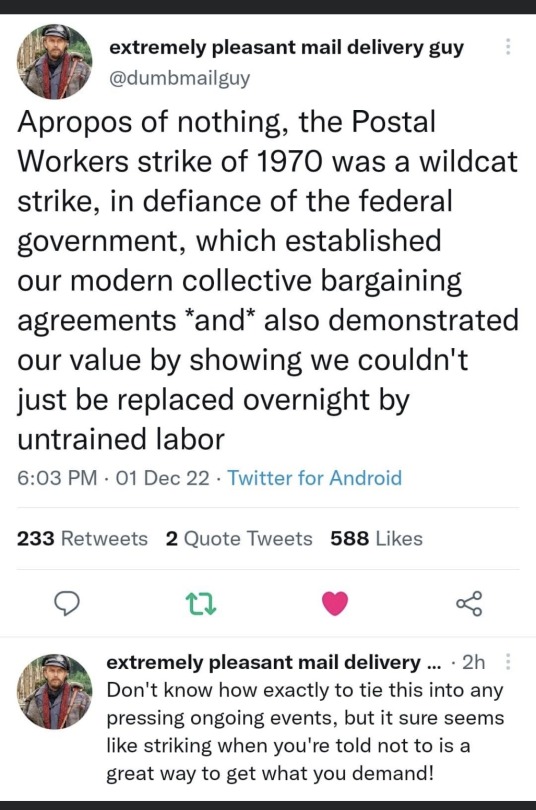
18K notes
·
View notes
Text
315 notes
·
View notes
Text
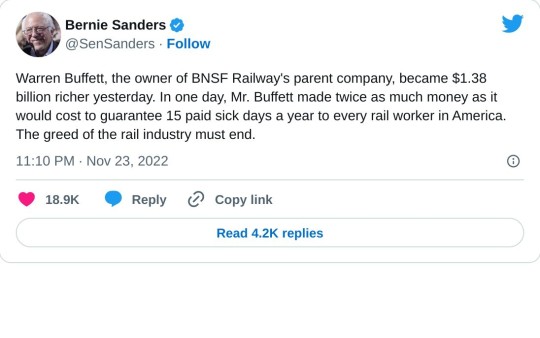
#us politics#2022#twitter#tweet#sen. bernie sanders#vermont#railway workers#railroads#railroad strike#railway unions#union workers#worker's rights#worker's union#warren buffett#bnsf railway#eat the rich#eat the fucking rich
173 notes
·
View notes
Text
Sen. Bernie Sanders said late Tuesday night that it was time to "put up or shut up" for any U.S. lawmaker who claims to fight for the working class as he and other progressives in Congress vowed to insert paid sick leave into a labor agreement between railway workers and the nation's rail companies.
With a vote in the U.S. House as early as Wednesday morning, Sanders was asked by MSNBC host Chris Hayes whether Congress has the authority to mandate that sick leave—the final key demand of railway workers unions who have battling the carriers for months—be added to the deal that congressional lawmakers have been asked by President Joe Biden to force through as a way to avert a strike by the workers that would have huge impacts on the national economy.
"Congress has the power to come up with an agreement in order to protect the economy," said Sanders. While he said that he doesn't know anybody who wants a strike—and acknowledged that such a work stoppage would hurt the broader economy—Sanders said the "bottom line" in this fight is quite clear.
"The bottom line," said Sanders, "is that the American people and workers throughout this country are profoundly disgusted by the kind of corporate greed that we are seeing. Everybody knows that billionaires are getting richer, working people are struggling, corporate profits are at an all-time high, and they're making goods unaffordable for ordinary Americans—that's the overall reality. And what you're seeing in the rail industry is that phenomenon in spades."
Citing statistics that show the major rail carriers have made an estimated $21 billion in profits over the last three quarters, another $25 billion in stock buybacks to enrich their wealthy investors, and multi-million dollar salaries to top executives, Sanders slammed the fact that the railway workers themselves "have zero—underline zero—guaranteed sick leave."
Watch the full interview:
youtube
On Tuesday night, Rep. Jamaal Bowman (D-N.Y.) introduced an amendment in the House that would add seven paid sick days to the labor contract proposal that was negotiated with the assistance of the White House earlier this year, but subsequently rejected by a number of the railway unions for lack of sick leave. With the strike deadline looming, Biden on Monday angered many rank-and-file union members and outside progressives by asking Congress to force through the previous contract deal without pushing for the inclusion of sick leave.
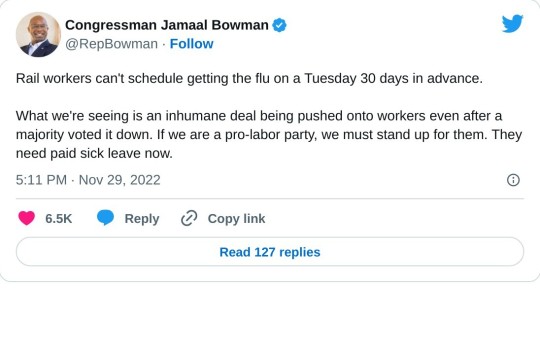
While House Speaker Nancy Pelosi on Monday backed Biden's call to push through a vote on the contract "with no poison pills or changes to the negotiated terms," but in a Dear Colleague letter issued Tuesday evening she adjusted that course by indicating that two votes would be held, explaining to members:
• First, we will consider the strike-averting legislation to adopt the Tentative Agreement, as negotiated by the railroad companies and labor leaders.
• Next, we will have a separate, up-or-down vote to add seven days of paid sick leave for railroaders to the Tentative Agreement.
• Then, we will send this package to the Senate, which will then go directly to President Biden for signature.
With Sanders vowing to fight for the same kind of inclusion in the Senate, reporting from Capitol Hill indicated that there may be enough Republican support for adding the paid sick leave to bypass the 60-vote threshold and overcome a filibuster in the upper chamber.
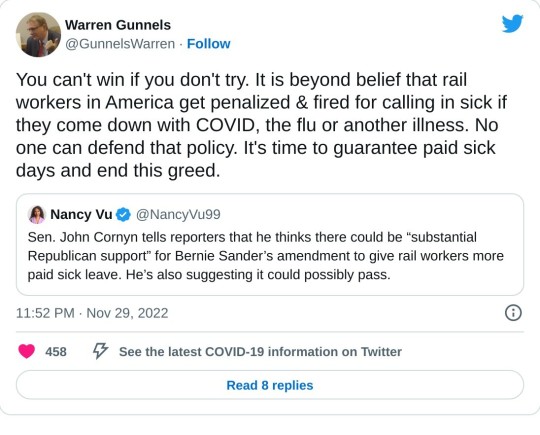
Asked if he thought he could get the ten necessary votes from the GOP in the Senate, Sanders said, "Well, who knows?" as he mentioned that Sen. John Cornyn (R-Texas), the party caucus' whip, has indicated "significant" support for the amendment among Republicans.
"Look, you have a number of Republicans who claim—claim—to be supporters of the working class," he added. "Well, if you are a supporter of the working class how are you going to vote against the proposal which provides guaranteed paid sick leave to workers who have none right now? So I am cautiously optimistic that we can get this done."

Asked by Hayes if this represents a "put your money where your mouth is" moment for a Republican Party that has tried to claim the mantle of being the authentic blue-collar party, Sanders nodded in agreement.
"Put up or shut up," said Sanders. "If you can't vote for this, to give workers today—who really have hard jobs, dangerous jobs—if you can't give them paid sick leave, don't tell anybody that you stand with working families."
#us politics#news#2022#sen. bernie sanders#vermont#biden administration#railway workers#railroads#railroad unions#railroad strike#paid sick leave#us house of representatives#us senate#msnbc#chris hayes#common dreams#progressives#progressivism#worker's rights#union workers#working class#YouTube#videos#Rep. Jamaal Bowman#twitter#tweet#speaker nancy pelosi#rep. nancy pelosi
136 notes
·
View notes
Text
Highlighting a few things about the railroad strike (just passing info along, I'm just now learning about it). The mainstream media, politicians, etc. are trying to spin this and the purpose behind the strike. This thread has lots of useful info and other threads about the railroad strike. I'll add the link in the reblog so this shows up in the search.
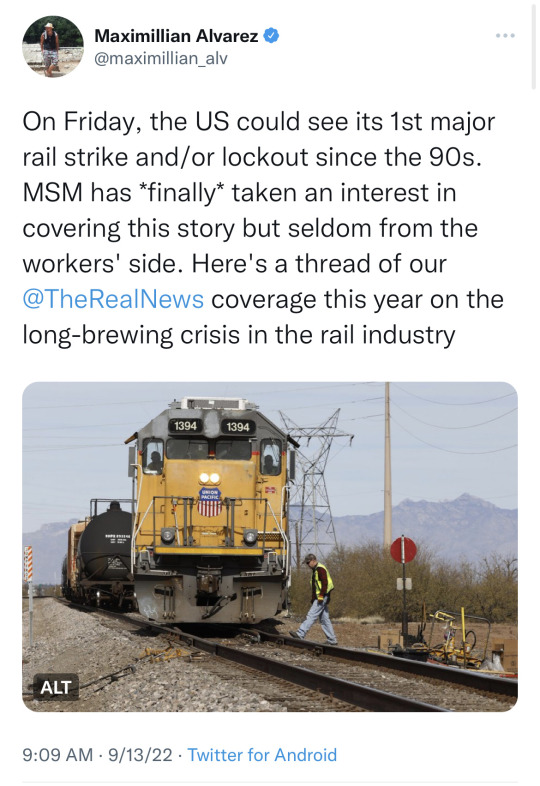
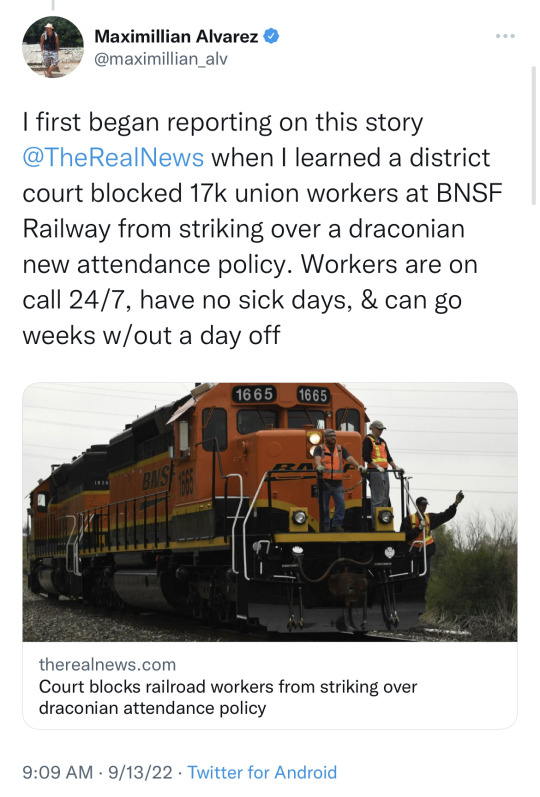
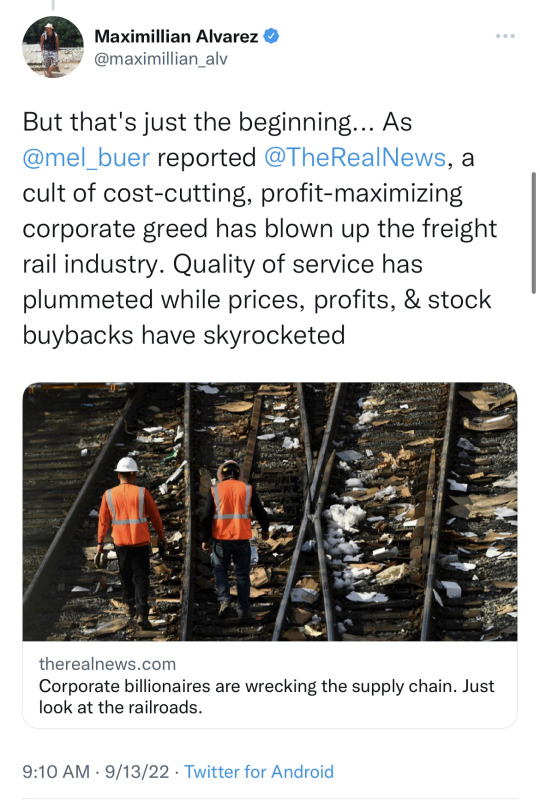

#railroad strike#worker solidarity#workers rights#railroad workers#unions#corporate greed#supply chain
127 notes
·
View notes
Text

AI prompt: I wish all railroad workers a very strike that destroys capitalism ✊🏾
[likes charge|reblogs cast]
#ai prompt#technospellcasting#techno witchcraft#technomancy#chaos magick#a digital psionic engine to create sympathetic vibes#digital spellcasting#cyber witchcraft#cyberspells#metawixen#hypervisual#digital talisman#metasigil#railroad strike#rail workers#anti capitalism
60 notes
·
View notes
Text

Bonzo, a five-year-old chimpanzee appearing in a forthcoming Hollywood motion picture, sits atop the counter at a waiting room in Grand Central Terminal, February 5, 1951. He was there to congratulate and thank a train-caller, left, for getting the New York Central’s 20th Century Limited into the city.
The Limited was one of the few trains to get through despite the railroad workers' strike. Bonzo's trainer, Henry Craig, right, holds the chimp. The board in the rear lists scheduled arrival times of trains and cancellations.
Photo: Tom Fitzsimmons for the AP via WHNT
#vintage New York#1950s#Tom Fitzsimmons#Bonzo#chimp#chimpanzee#Grand Central Terminal#February 5#Feb. 5#Grand Central Station#20th Century Limited#railroad strike#railroad workers' strike#Henry Craig
34 notes
·
View notes
Text

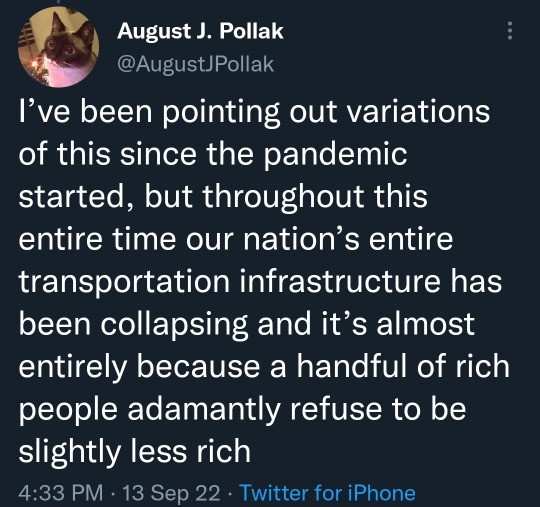
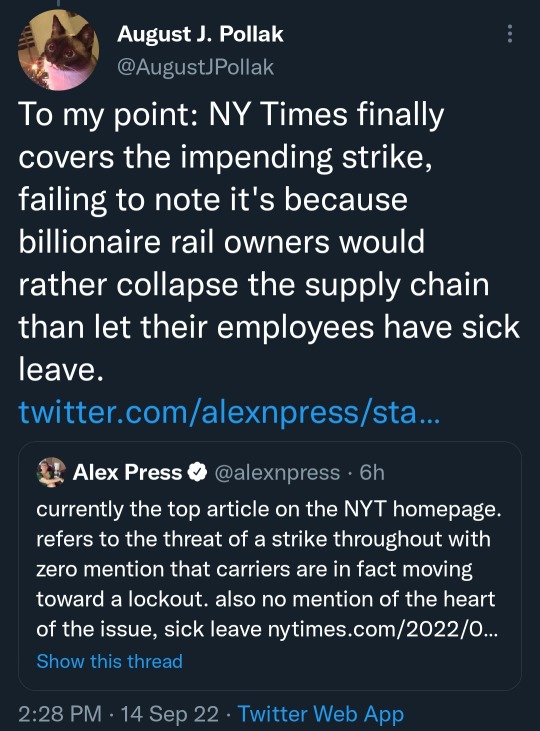
[DESCRIPTIONS OF IMAGES: There are three screenshots of a Twitter thread from a user named August J Pollak.
The first tweet reads: "Absolutely wild how the most important story in the country right now is an impending strike of 125,000 railroad workers that will devastate supply chains and no one is covering it because it’d be virtually impossible to avoid that the unions are completely in the right here."
The second tweet reads: "I’ve been pointing out variations of this since the pandemic started, but throughout this entire time our nation’s entire transportation infrastructure has been collapsing and it’s almost entirely because a handful of rich people adamantly refuse to be slightly less rich."
The third tweet reads: "To my point: NY Times finally covers the impending strike, failing to note it's because billionaire rail owners would rather collapse the supply chain than let their employees have sick leave." The user quote tweets another user by the name of Alex N Press as well, who is talking about the aforementioned New York Times article, saying: "Currently the top article on the NYT homepage. Refers to the threat of a strike throughout with zero mention that carriers are in fact moving toward a lockout. Also no mention of the heart of the issue, sick leave."
58 notes
·
View notes
Note
As a labor historian, what do you make of the current railway dispute in Congress?
I'd recommend reading the reportage of my colleague Erik Loomis, to start with, because he's been following the story a lot more closely than I have.
The historical context here is that there is a long history of the Federal government seeking to intervene in strikes that are viewed to be widely disruptive to the national economy - in addition to the long and bloody 19th century history of Hayes and Cleveland and others suppressing strikes with the National Guard and the Army, you can trace the story back through Theodore Roosevelt and the anthracite coal strike of 1902, Woodrow Wilson and the Adamson Act and the Railway Labor Board during WWI, then the creation of the Railway Labor Act of 1925, then FDR and his rather complicated legacy that spans the gamut from "if I were working in a factory, I'd join a union" to "a plague on both their houses," then Harry Truman and his nationalization of the steel industry but also vetoing Taft-Hartley, and on and on.
What happened in this instance is that there had been a rather troubled negotiation and mediation between the 12 railway unions and a bunch of freight railroads, dating back to 2019. Under the Railway Labor Act, the Biden Administration in July set up a Presidential Emergency Board to impose a Tentative Agreement and institute a "cooling-off" period that would prevent a strike that the Biden Administration was worried would lead to inflation. This Tentative Agreement was agreed to by some unions and not others, largely around the sick day issue.
In late November, Biden asked Congress to enact the Tentative Agremeent into law under the Railway Labor Act. Now, the Biden Administration could have forwarded any package it wanted to to Congress, but ultimately chose just to send the Tentative Agreement. This royally pissed off Bernie Sanders who wanted to deal with the sick day issue, which is why the House passed both the Tentative Agreement and a separate bill that would have enacted 7 days of paid sick leave. The Senate then passed the Tentative Agreement on a bipartisan vote, but then the Republicans in the Senate filibustered the sick leave bill, so that it failed despite getting 52 votes to 43.
33 notes
·
View notes
Text
Which side are you on?

Vintage button from the 1922 Great Railroad strike.
27 notes
·
View notes
Text
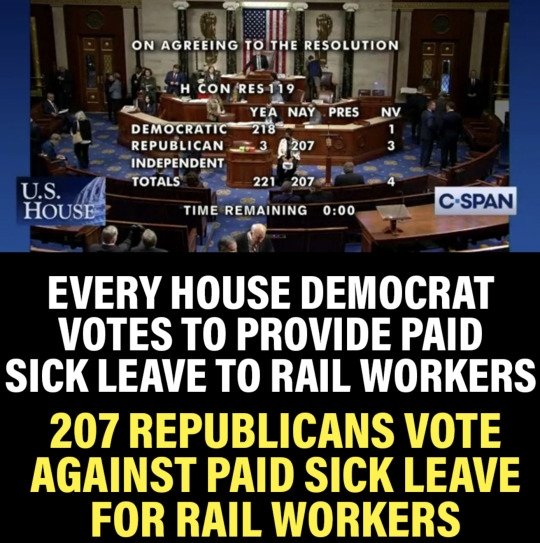
After monthslong fears of a national railroad strike, Congress voted Wednesday to force an end to negotiations between the railroads and their unions with a pair of bills designed to draw concessions from both sides.
One bill (which passed with 79 Republican votes and 211 Democratic ones) codified the higher wages the railroads were offering. Members of Congress also voted to implement mandatory sick time as part of the deal, a nod to worker demands for more paid time off that railroads were unwilling to relent on.
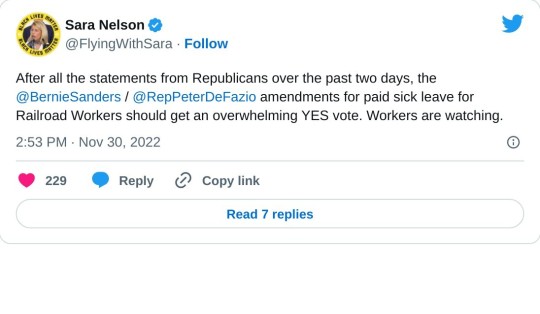
That successful amendment, sponsored by Democratic Representative Peter DeFazio and independent Senator Bernie Sanders, came on the heels of bipartisan criticism of President Joe Biden's support of a deal without concessions for paid time off, a deal-breaker that earned scorn from progressives like Alexandria Ocasio-Cortez alongside conservatives like Missouri Senator Josh Hawley.
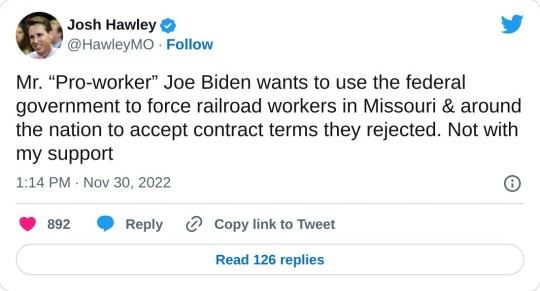
Florida Senator Marco Rubio tweeted Tuesday he "will not vote to impose a deal that doesn't have the support of the rail workers."
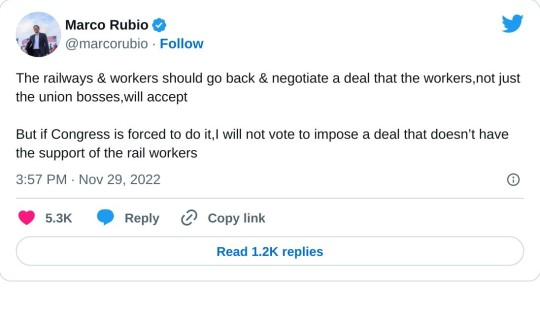
Ultimately, all but three Republican members of Congress—who, notably, have unlimited sick days and all 10 federal holidays off per year—still voted against it.
Internally, the result was largely expected. House Minority Leader Kevin McCarthy indicated to reporters prior to the vote few Republican members were expected to vote in favor of increasing paid time off.

But outwardly, it's not clear why: So far, no Republicans have offered a public rationale for rejecting the deal, nor is it clear whether they opposed the concept of sick time or congressional intervention in railroad workers' efforts to negotiate the deal for themselves.
In early negotiations, the unions requested 15 days of sick leave, while the resolution adopted Wednesday notably had just seven. Numerous Democrats also voted against the larger bill to avert the strike, calling the compromise a betrayal of workers' desire to negotiate a contract on their terms.
However, the fact no Democrats voted against the sick time provision signaled to some that Republicans were voting to prevent workers from obtaining benefits they themselves have: namely, the ability to take time off work whenever they feel the need.
In an earlier vote in the Senate this year, North Carolina Republican Richard Burr and Mississippi Republican Roger Wicker introduced a resolution intended to resolve the strike that did not include provisions for sick leave, earning scorn from Sanders in a speech on the Senate floor. (The resolution failed.)
The disparity between railroaders and members of Congress was visibly on display on social media after the vote.
Notably, a Politifact examination of a Facebook post several years ago alleging similar claims determined there is no limit on sick days or time off for members of Congress, while a Bureau of Labor Statistics report from 2020 found the average private industry worker received an average of eight paid holidays, seven paid sick leave days and 11 paid vacation days per year after one year of work.
And while railroaders get anywhere between three to four weeks of paid vacation and over 10 personal leave days per year, many do not have the flexibility to use them the way people in other industries—like Congress—typically do.
"The 'working class party' strikes again," Justin Baragona, a media reporter for the Daily Beast, tweeted following the vote.
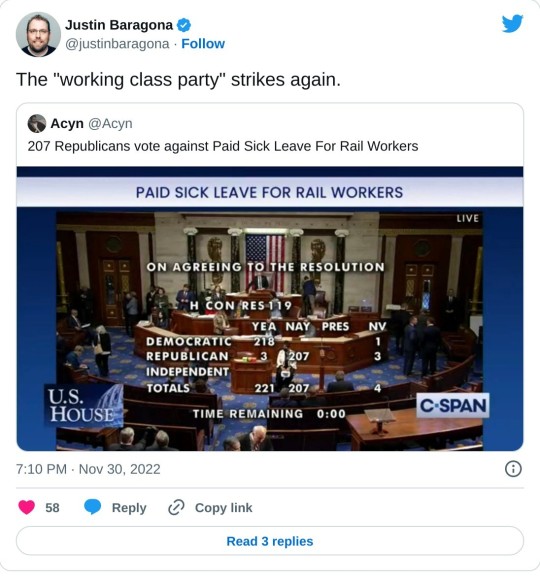
#us politics#2022#twitter#tweet#republicans#conservatives#gop#paid sick leave#railway workers#railroad unions#railroad strike#railroads#working class#worker's rights#worker's union#pro union#union workers#newsweek#rep. Peter DeFazio#sen. bernie sanders#sara nelson#sen. josh hawley#sen. marco rubio#jake sherman#rep. kevin mccarthy#Justin Baragona#sen. richard burr#sen. Roger Wicker
48 notes
·
View notes
Text
I don’t understand how the potential railroad strike isn’t getting any coverage. It’s arguably the most important US news story out there rn but I guess everyone is too busy talking about muskrat’s Twitter fuckery
15 notes
·
View notes
Text
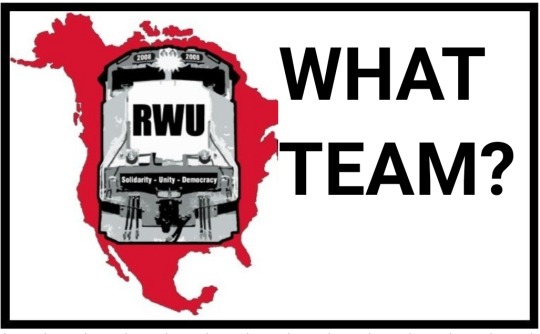

7 notes
·
View notes
Text
Support railroad workers' demands!
#people's cdc#railroad workers#railroad strike#workers rights#IWW#wobbly#anarchism#stop attacking the proletariat
5 notes
·
View notes
Link
And now the Senate must pass this bill.
3 notes
·
View notes
